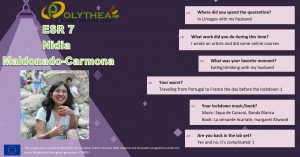Employer: University of Limoges (UNILIM, France), Cotutelle: University of Coimbra (UC, Portugal)
Supervisors: Dr. Stéphanie LHEZ (UNILIM), Pr Mariette M. PEREIRA (UC)
Research secondments: INSERM (UMR 1092, Limoges), Biolitec
Practical rotation: Selvita
ESR representative at the Supervisory Board (2019-2020)
Research project description and main objectives: The struggle against microbial infections, contaminations is a global issue with important societal impacts, especially with the continuous emergence of antibiotic-resistant bacteria. The development of new bactericidal materials to prevent bacterial colonization of surfaces in various environments (agro-food, medical…) represents a major challenge. In this respect, photodynamic antimicrobial chemotherapy (PACT) is a promising alternative approach to fight bacterial biofilm contaminations. In order to prevent the growth of planktonic bacteria and the formation of biofilms through PACT, it appears to be essential to investigate formulation/coating nature (films, powder, spray, encapsulation …), effect on the photosensitizer (PS) and efficiency in the photodynamic process.
This project will focus on the development of bio-inspired materials with suitable properties to be used as photodynamic drug formulations (light transparency, non-toxicity, stability …) and easy to process. Different approaches will be developed: coating surfaces with biocompatible polymers bearing a photosensitizer (cationic phthalocyanines and porphyrins) trapped inside or grafted.
The main objectives of this project are:
1. the development of new materials
2. chemical modification of the photosensitizers
3. evaluation of antibacterial properties on both planktonic bacteria and biofilms.
Nidia’s publications :
- N. Maldonado-Carmona, T.S. Ouk, M.J.F. Calvete, M.M. Pereira, N. Villandier, S. Leroy-Lhez, Conjugating biometerials with photosensitizers: advances and perspectives for Photodynamic Antimicrobial Chemotherapy, Photochemical & Photobiological Sciences, 2020, DOI: 10.1039/C9PP00398C
- N. Maldonado-Carmona, G. Marchand, N. Villandier, T. S. Ouk, M.M. Pereira, C.A. Calliste, A. Zak, M. Piksa, K.J. Pawlik, K. Matczyszyn, S. Leroy-Lhez, Porphyrin-Loaded Lignin Nanoparticles Aglainst Bacteria: A Photodynamic Antimicrobial Chemotherapy Application, Frontiers in Microbiology, 2020, DOI: 10.3389/fmicb.2020.606185
- N. Maldonado‑Carmona, T.‑S. Ouk, S. Leroy‑Lhez, Latest trends on photodynamic disinfection of Gram‑negative bacteria: photosensitizer’s structure and delivery systems, Photochemical & Photobiological Sciences, 2021, https://doi.org/10.1007/s43630-021-00128-5
- N. Maldonado-Carmona, T-S. Ouk, N. Villandier, C. A. Calliste, M.J.F. Calvete, M.M. Pereira and S. Leroy-Lhez, Photophysical and Antibacterial Properties of Porphyrins Encapsulated inside Acetylated Lignin Nanoparticles, Antibiotics, 2021, https://doi.org/10.3390/antibiotics10050513
- G. Marchand, G. Fabre, N. Maldonado-Carmona, N. Villandier, S. Leroy-Lhez, Acetylated lignin nanoparticles as a possible vehicle for photosensitizing molecules, Royal Society of Chemistry, 2020, DOI: 10.1039/D0NA00615G
Links:
- Nidia met with high school students in Limoges on March 18th, 2019
- Nidia’s presentation at the World Congress on Light and Life
- Nidia elected at the Supervisory Board
- Nidia presented a poster to the 13° Encontro Nacional de Química Orgânica and 6° Encontro Nacional de Química Terapeutica
- Nidia’s covid-19 interview:

- Nidia’s presentation to the PANIC online conference 2020: http://www.polythea.eu/2020/10/14/phobia-annual-nanophotonics-international-conference/
- Nidia won a prize at the IPA photo contest
- Nidia defended her thesis on September 14th, 2021

